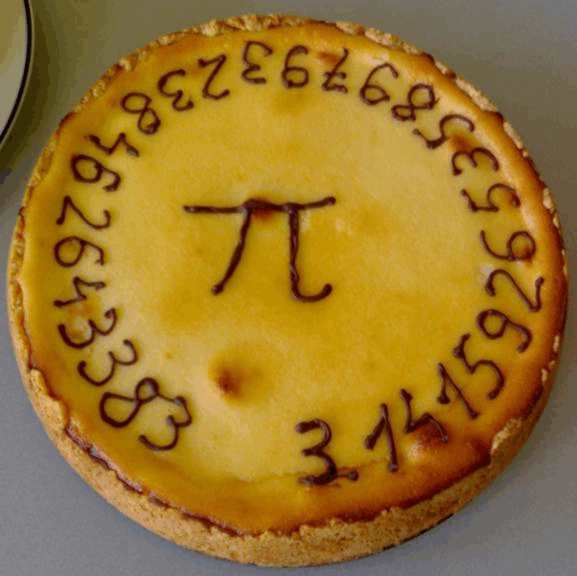| Pi Day 2023 - Irrational And Transcendental |
| Written by Mike James | |||
| Tuesday, 14 March 2023 | |||
|
It's Pi day again... Even after so many, I still have things to say and think about this most intriguing number. The most important things about Pi is that it is irrational and one of the few transcendental numbers we can identify - why exactly? There are so many interesting properties of Pi that it really does deserve a day to itself - and 3/14/2023 is a good day to pi... Today there are celebrations of Pi going on all over the place and most of them involve eating Pi, but I want to raise some interesting questions about the number we all love to celebrate. These are questions that you might want to try and solve and so make it a real Pi day. When I was first working on computer vision, one of the main problems was inventing "features" that abstracted some property of what we were looking at. In those days we used hand-crafted features and not learned features - which is what today's neural networks use. One particularly easy feature was generalized Pi. If you take any shape - a square say - and define what you mean by its diameter and work out: GPi = Perimeter/Diameter then you have a feature that discriminates between different shapes. For example, if you have a square of side x then the perimeter is 4x and the diameter d - the widest part of the square is the diagonal - and d=x√2 hence pi(square)=4/√2= 2√2. This is value can be used to identify a square from all other polygons. For a general regular polygon we use twice the circumradius for the diameter which is the length of the line that connects a vertex to the center of the polygon. Of course, as the number of sides in a regular polygon increases the value of generalized Pi tends to Pi for a circle, which is, of course, the familiar irrational transcendental number we are celebrating. This is the basis for many an introduction to Pi and it shows how we could compute Pi, but this procedure raises some interesting questions that are usually ignored. Are the polygon-generalized Pis irrational and if they are, are they also transcendental? In other words, is the value of Pi for a circle special in being both irrational and transcendental? The first part of the question is moderately easy to answer. An irrational number is one that cannot be expressed as the ratio of two integers. For example, √2 is irrational as it cannot be expressed as a fraction. As decimals, irrational numbers have expansions that never come to an end and never fall into a repeating pattern. You can think of this as rational numbers are "finite" decimals e.g. 0.23134 i.e. it stops after 4, but irrational numbers need an infinity of digits to specify them: 0.23122334352545454532678864 and so on forever. Irrational numbers often occur when we calculate areas - what is the area of a equilateral triangle with unit sides? Answer √3/4 which is irrational. For a regular polygon with unit side, the circumradius is given by: R=1/2sin(Pi/n) This means that generalized Pi for an n-sided polygon is: Pi(n)= n/sin(Pi/n) The only rational values of sin for rational multiples of Pi are 0, plus or minus1/2 and plus or minus 1. So that means, apart from n=6, Pi(n) is irrational. You can think of this as indicating that the irrationality of Pi isn't particularly special. If you think of a circle as the limit of the perimeter to diameter of a regular polygon with increasing numbers of sides, then it is irrationality all the way down - apart from the hexagon. The second part looks at how Pi becomes transcendental. A transcendental number is one that is not the root of a finite polynomial with rational coefficients. You can think of this as another brush with infinity because transcendental numbers need equations that have an infinite number of terms to define them. It is not enough to need an infinite number of digits, when you are writing down a transcendental number it needs an infinite equation to define it. Pi is transcendental and provably so. It is clear that Pi(6) isn't transcendental because it isn't even irrational. What about the rest? I don't know the answer. I think that as they are all expressible with a finite number of roots none of them is transcendental and Pi is special because it is transcendental, but I can't prove it. I think that Pi is where the second infinity enters the picture and converts an irrational number into a transcendental number. If so its another reason to think Pi is special.
More InformationRelated ArticlesPi Day 2022 - It's Irrational!!! Pi Day 2020 - A Meditation On Numbers Google Smashes Pi Record For Pi Day Non-Computable And Other Numbers It's Pi Day 2018 And Google Gets In On It With A Doodle The Life Of Pi - Yes It's Pi Day Celebrate Pi Day It Contains All Human Knowledge 60 trillionth binary digit of pi-squared calculated Yahoo! Gets to the 2 Quadrillionth bit of Pi - it's zero The Programmer's Guide To The Transfinite To be informed about new articles on I Programmer, sign up for our weekly newsletter, subscribe to the RSS feed and follow us on Twitter, Facebook or Linkedin.
|
|||
| Last Updated ( Friday, 14 March 2025 ) |


